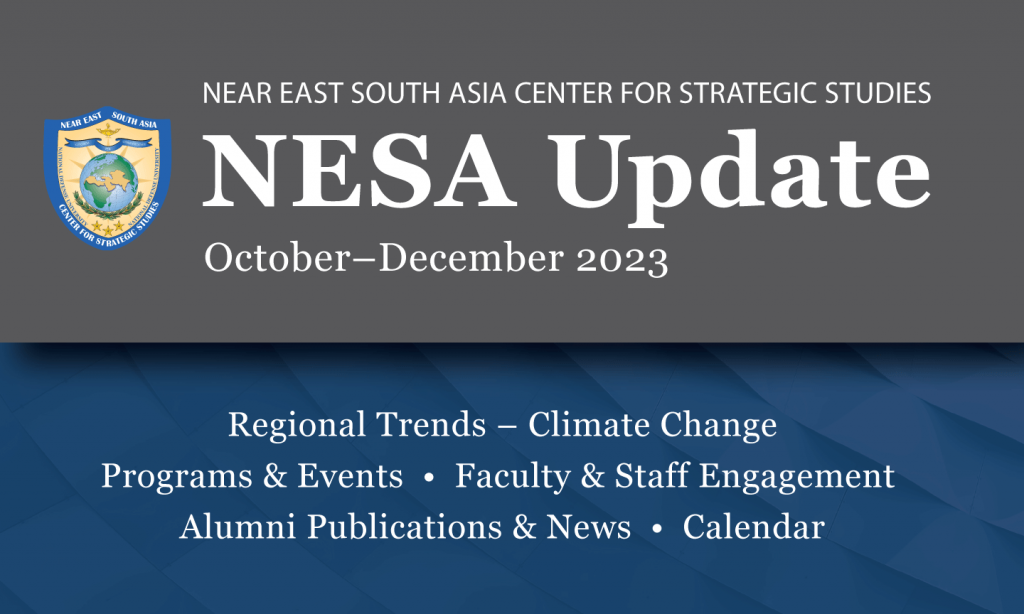October–December 2023 NESA Center Update Report
January 23, 2024 2024-01-23 13:57October–December 2023 NESA Center Update Report
View the NESA Center October–December 2023 focused on climate change trends. The update also highlights October through December NESA Center programs and events, faculty and staff engagements, alumni contributions, and a calendar with upcoming events.
Regional Trends – Climate Change
-
The outcome of the Conference of the Parties (COP) 28, held in Dubai from late November to mid-December 2023, is seen as a success. For the first time, participants from all countries reached a consensus on transitioning away from fossil fuels, though in a “just, orderly, and equitable manner.” It will take time to see if countries will make good on this promise. Equally important, the United Arab Emirates, U.S., UK, European Union, and other countries pledged billions of dollars to compensate developing countries for environmental disasters, and an agreement was reached to establish a fund to manage these payments that will initially be hosted by the World Bank. The bottom line is that people and governments from all over the world are taking climate change and global warming seriously.
-
The scale of resource depletion in our waters is starting to become more of a policy issue than just for seafarers and maritime policy professionals. Beyond sea-level rise, the scale of Illegal, Unreported, and Unregulated Fishing (IUUF) and illegal dumping has caused ongoing strains on maritime environments that, in turn, have adjusted how global fishing operates as an industry. From there, the scope of regulatory seams has expanded, with the seas becoming even more dangerous for fishermen (who remain the largest sector at sea at any given moment in time). Logistical processes tied to fishing, tax revenues associated with fishing, and maritime law enforcement capabilities are, in turn, being tested. All the while, more of the world’s population relies upon fishing as a food source. As the situation worsens, as it looks likely, the price of ocean catch will increase, food insecurity will further expand, tensions at sea will further escalate, and illicit activity in the high seas will become even more common. Traditional policy approaches are seen as insufficient in scale, so the new emphasis among regional conversations is to build networks of researchers, journalists, coast guards/navies/maritime constabularies, regulatory regimes, NGOs, legitimate commercial entities, and even technological firms to develop new transnational approaches to the problem. Reporting of the degradation of our waters is becoming more common in an effort to expand the public’s understanding of what problems loom on the horizon.
-
Climate Change Reflections:
Climate change is not new to the NESA Center. NESA conducted its first Senior Executive Seminar Alumni Symposium in October 2008 with the newly introduced topic of non-traditional security threats — specifically climate change, food, water, and energy security trends before it became a fashionably “hip” or an “in” topic of interest. There were twenty-two participants from Afghanistan, Bangladesh, Iraq, Israel, Jordan, Morocco, Nepal, Pakistan, Saudi Arabia, Sri Lanka, Turkey, and the United States. The focus of the program also included Russia’s adventurism and the U.S. elections.
While the NESA Center was initially skeptical about climate change resonating with regional participants, the opposite proved to be the case. Participants were surprisingly extremely focused on climate change and its direct ties to national and regional security. Climate change, for them, was a real threat. Their very non-traditional approach in looking at security culminated in the symposium with a simulation exercise focused on cascading natural crises as a direct or indirect result of climate change developed in partnership with UN expert/consultant Dr. Marc Levy, Deputy Director of the Center for International Earth Science Information Network (CIESIN) at Columbia University. It examined multiple stressors — unusual weather events followed by droughts and floods, food shortages, movements of large numbers of people, and the spread of disease — and the responses and capacity of governments and militaries on a national and sub-regional basis. For most participants, this was a natural extension of discussions on national security and threats in the 21st century.
-
One participant mentioned that “… there are things to learn from the South East Asian fire disasters, avian flu, and the tsunami in terms of cooperation among countries cumbered by deep mutual suspicions.”
-
All participants seemed ready from the start to accept as a given, the notion that climate change, food crises, pandemics, and the secondary/tertiary impacts (population movements and globalization) need to be treated as “hard” national security issues with devastating political consequences if not managed well.
-
Climate change was seen as a “given” by many in the region, so there was no need to “sell” the topic, which, in 2008, was not the case with many U.S. audiences.
-
While most countries had Emergency Disaster Plans, the plans were seen as too static and needed to be better equipped for multiple stressors, interagency coordination, or complex international coordination with NGOs and numerous foreign donors. Major institutional reorganization was needed to effectively deal with these issues in the future.
Since discussing climate change in 2008, NESA has continued over these last 16 years to include in its programs these same elements of the security impacts of climate change in our region and expanded our view to also include more of the African continent. More significantly telling is looking back at the takeaways and the keen insights articulated by NESA participants in 2008, especially in light of today’s realities — the Ukraine War and with its global food and energy insecurity; the COVID-19 pandemic; climate migration; and the continuing conflicts over competition for air, land, and water. This simply leaves the open question … creatively looking ahead as NESA did in 2008, what should the NESA Center be focusing on now?
-
Read the full NESA Update report [PDF]
Read other NESA Center reports here.







